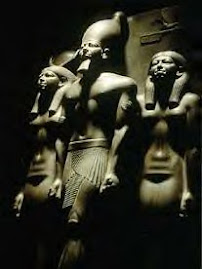Shem Hotep ("I go in peace").
Fantasia Barrino her song, called “Baby Mama.” Fantasia, winner of last year’s “American Idol” contest, dedicates the song “to all my baby mamas.” Being a baby mama these days, Fantasia tells us, is a “badge of honor.” Those “single mothers trying to make a way,” she goes on should have their own holiday. As I listened to Fantasia caterwauling about how great it is to be a “baby mama,” I was reminded once again why I hate the show “American Idol. It’s that any of us can go to any storefront church in black America and find better singers than the ones that appear on the show. That’s bad enough. But now we have one of these marginally talented “winners” running around the country extolling the virtues of making a mistake? Let’s face it: that’s what many “baby mamas” have done. They got knocked up by some loser who couldn’t or wouldn’t marry them. That’s a mistake. You don’t go around singing songs praising your mistakes. You correct them. But let’s assume, and believe me, this is only for argument’s sake, that Fantasia is right, and that “baby mamas” do deserve praise. Why do they deserve more praise than the sisters who decide to get married and then have children? Why do “baby mamas” deserve more praise than those sisters who decided to wait before either having children or getting married and decided to attend college and get a career and degree first?
And isn’t Fantasia ignoring the wealth of problems single motherhood has brought black America? If I’ve heard one person involved in juvenile justice matters tell me once, they’ve told me a score of times: most of the young black men in “the system” come from homes with a single mother. No father around. In a city like Chicago, where 50 percent of black boys don’t graduate from high school, you can bet most of those dropouts are the sons of “baby mamas.” She’ll have her defenders, I’m sure. There’ll be folks saying that some baby mamas do wonders for their children, struggle against overwhelming odds and have it going on. But included in the baby mama numbers are those teen-age girls, poor, uneducated and unemployed, who do neither themselves nor their children a favor by giving birth too soon. It also includes those baby mamas on crack or heroin who shouldn’t even have thought of conceiving a child. And Fantasia’s song was a tribute to all baby mamas. “All” is one of the least ambiguous words in the English language. It doesn’t mean some. It doesn’t mean most.
UrbanDictionary.com: Baby Momma
“The mother of your child(ren), whom you did not marry and with whom you are not currently involved.”
“Basically a woman you had a child or children with who you didn’t marry and are no longer involved with. Usually associated with hoodrats and trailer park b***hes.”
Clearly the guys who thought of these definitions don’t think of the term “baby mama” as a compliment. It sounds suspiciously like the guys who gave us the term “baby mama” are the same ones running around with their pants down over their butts. They’re the ones who elevated the “gangsta,” “pimp”and “thug” to near-hero status in black America.
If you’re divorced and have children, you’re a divorced mother. If you’re a widow and have children, you’re a widowed mother. If you’re single and have children, but the father isn’t part of the miscreant horde described above, you’re a single mother.
Fantasia, next time just use a condom.
Post-traumaticstress disorder, or PostTraumatic Slave Syndrome.
The African American slavery experience has involved every possible cause for post-traumatic stress disorder, or PostTraumatic Slave Syndrome.
Post Traumatic Slave Syndrome: America’s Legacy of Injury and Healing.
QUESTION: What is PTSS?
ANSWER: Post Traumatic Slave Syndrome (PTSS) is a condition that exists as a consequence of multigenerational oppression of Africans and their descendants resulting from centuries of chattel slavery. A form of slavery
which was predicated on the belief that African Americans were
inherently/genetically inferior to whites. This was then followed by
institutionalized racism which continues to perpetuate injury. Thus,
Multigenerational Trauma together with continued oppression and the
Absence of opportunity to heal or access the benefits available in the
society leads to Post Traumatic Slave Syndrome. M+A=P
Under such circumstances these are some of the predictable patterns of
behavior that tend to occur:
Key Patterns of behavior reflective of PTSS:Vacant Esteem
Insufficient development of what I refer to as primary esteem, and
feelings of hopelessness, depression and general self destructive outlook.
Marked Propensity for Anger and Violence Extreme Feelings Of Suspicion Perceived negative motivations of others. Violence against self, property and others, including the members of ones
own group, i.e. friends, relatives, or acquaintances.
Internalized racism
Learned helplessness, literacy deprivation, distorted self-concept,
antipathy for: Members of ones cultural/ethnic group,Mores associated with ones cultural/ethnic heritage Physical characteristics associated with ones cultural/ethnic group Cultural dissonance:
A feeling of disharmony and psychological conflict resulting from a loss of cultural identity and traditional customs, values and needs.












No comments:
Post a Comment